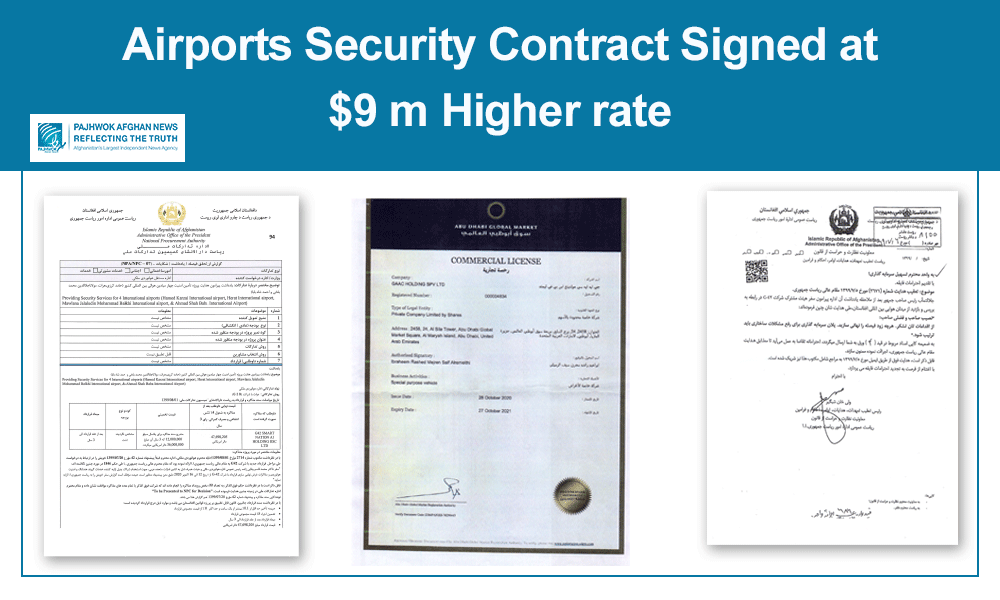KABUL (Pajhwok): Former Afghanistan Civil Aviation Authority (ACAA) has signed a contract at a $9 million higher rate with a foreign company to provide security for four airports.
The contract includes security arrangements for airports in Kabul, Herat, Mazar-e-Sharif and Kandahar provinces.
Pajhwok has also obtained the registration document of the General Aviation Airport Coalition (GAAC) company which was founded in the UAE on October 28, 2020 only six days before the contract was signed with it.
Documents received by Pajhwok show the contract was previously signed with a well-known British company against $12 million a year, but the newly founded GAAC company was paid around $15 million a year for the same service, which shows a 24 percent increase in the rate.
Pajhwok has access to documents which show that GAAC was registered in Afghanistan only six days after it was formed in Dubai in 2020. After it was registered, ACAA awarded a security contract of four airports to the company on a rate $9 million higher compared to the previous rate.
The contract is for three years for a total cost of $47.69 million and the fixed budget for each year is $15.6 million.
A source in the ACAA told Pajhwok Afghan News on condition of anonymity that the contract was signed with a security company called GAAC in 2020 for the security of four Afghan airports for a period of three years.
According to the source, $15.6 million was paid as annual security cost to the UAE company , but a previous contract signed with another company included $12 million in cost for airports’ security on annual basis.
ACAA official said the contract had previously been signed with Olive Group but now it was signed with GAAC on a 24 percent higher rate.
"The previous contract with Olive Group was for $12 million on yearly basis which the company should also had to purchase needed equipment, but the new contract which is 24 percent higher includes only services, not purchase of equipment,” the official added.
The source said that Olive Group is a well-known British security company that has security contracts in many countries around the world.
"When the contract was signed with the UAE company, it did not exist and was created after the contract," the source added.
The official said that another British company named G42 was ready for the contract against $10 million a year, but officials concerned did not accept it due to their personal interests.
Companies changed
Pajhwok findings show that the contract was discussed with G42 company, but it was actually signed later with another company.
Documents show the contract was signed with GAAC instead of G42, which was newly formed in UAE on October 28, 2020.
National Procurement Agency (NPA)’s investigation
Pajhwok has obtained a letter from the NPA, criticizing the contract, stating that the contract was awarded to a company with no experience in the field at a 24 percent higher rate. The letter said that the contract should be reconsidered.
The problem with the contract was discussed in a meeting chaired by former President Ashraf Ghani in 2020, in which the first and second vice presidents, finance, justice and economy ministers, the president's legal adviser and the private sector's representatives were also present.
However, the Presidential Palace’s Agreements, Decrees and Orders Department, in a letter to Investment Facilitation Unit said, “The president about your report after the trip of UAE’s G42 company’s officials, thanked your performance and ordered urgent finalization of his decision and investment plan.”
Response from ACAA
However, Mohammad Qasim Wafaizada, a former director of ACAA, told Pajhwok that the contract for four Afghan airports had been prepared by the Investment Facilitation Unit and the Legal Unit of the Presidential Palace.
"The Investment Facilitation Unit and the Legal Unit of the Presidential Palace were the first who found the company which had also received a contract agreement from the Presidential Palace," he said.
He added that when the ACAA was involved in the case, it brought many reforms in the contract before it was signed.
Wafaizada said that the main problem with the contract was in its implementation.
"Our problem was in the implementation of the contract and lack of transparency in the spending of the money as the company was not sharing its documents on spending. I also did not pay the invoices of the company. This issue turned into a problem between me and Presidential Palace and it was also the reason I resigned and they appointed a person of their choice.”
He said the company name was G42 at the time of signing the contract, but it was later registered as GAAC.
On the other hand, Attaullah Naseeb, director of the Investment Facilitation Unit, told Pajhwok that contracts were signed based on a process in which the views of all relevant organs are taken.
He said that former ACAA director, Wafaizada and his delegation had traveled to UAE before signing the contract.
“The contract was signed after it was defended by Wafaizada and approved by National Procurement Commission,” he said.
He said that invoices of the company were also signed by ACAA and the documents show the person who signed them.
The documents available show that the contract was aimed at corruption and former officials at the time were involved in it.
This report has been produced by Pajhwok and financially supported by UNDP and Denmark.
Mds/ma









GET IN TOUCH
NEWSLETTER
SUGGEST A STORY
PAJHWOK MOBILE APP